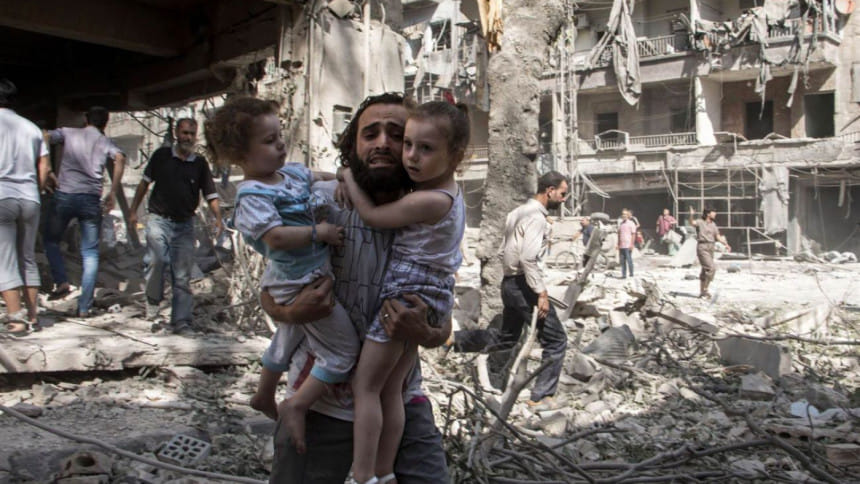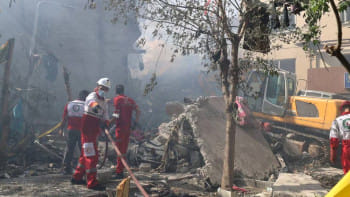Peace Over War

Peace is often defined as the absence of violence, conflict, hostility, or war. Yet this definition is not only derogatory, but also deceptive. Peace is not merely the absence of violence; it is the vanquishing of oppression by independence—the victory of justice over injustice. You cannot separate peace from freedom, because a man cannot have his peace unless he has his freedom. If an oppressive society lacks violence, the society is nonetheless not peaceful, because of the injustice fuelled through oppression.
According to the Stockholm International Peace Research Institute (SIPRI), USD 1,676 billion was spent on military expenses globally in 2015. Research has shown that only 13 percent of this amount would suffice in ending poverty and hunger worldwide. On the other hand, 12 percent would be required for universal primary and secondary education, and a mere five percent could ensure healthcare for all. Hence, globally a reallocation of resources from weapons of war to pillars of peace can play an instrumental role in achieving the SDGs.
The same is true for individual countries. For example, in 2016, the United States spent USD 68 billion on education, which was roughly one-tenth of its USD 611 billion military expenditure. Thus, by cutting back on its military expenditure by only 10 percent, the US can double its expenditure on education, which would then contribute towards achievement of SDG 4 (education for all).
The 2030 agenda for sustainable development is a continuation of the development agenda set in the 90s, known as the Millennium Development Goals (MDGs). The new agenda sets a way forward where the world as a whole considers a comprehensive agenda which encompasses both socio-economic and environmental issues. The notion of peace is a central element of the Sustainable Development Goals (SDGs), and makes an appearance twice in the SDGs.
Peace features as one of the five components of sustainable development or "5 Ps" that include people, planet, prosperity, and partnership. Peace is also incorporated in SDG 16 (promote peaceful and inclusive society) and SDG target 16.1 (significantly reduce all forms of violence). However, one may still argue that the general discourse on SDGs has not adequately emphasised peace as a prerequisite for SDG attainment. Nevertheless, the United Nations aptly points out that "there can be no sustainable development without peace and no peace without sustainable development."
In order to acknowledge that peace is a prerequisite for sustainable development, we simply need to take a cursory glance at war. War, as a game of death, turns people into casualty statistics in a news report. War is a catastrophe on the face of the planet that obliterates the probability of prosperity or partnership. Every cannon fired and every missile launched sets us back in terms of sustainable development. According to a study, it takes 14 years to recover economically, and 25 years to rebuild state systems and institutions, after a typical civil war that lasts seven years.
There is not even an iota of doubt that in order to achieve the SDGs, countries all over the world need to prioritise peace over war. However, there is an evident lack of commitment to peace which is manifested in the gulf between the words and actions of countries worldwide. This is profoundly demonstrated in the issue of nuclear weapons. Opinion polls have showed that in seven of the nine nuclear-armed nations, the majority of the people are in favour of nuclear disarmament. Yet according to the Global Zero Nuclear Weapons Cost Study report, USD 105 billion was spent on nuclear weapons worldwide in 2011. This is three times the amount of official development assistance given to Africa in the same year. Every hour six people die due to hunger. Nevertheless, USD 12 million is being spent every hour on the production, maintenance, and modernisation of nuclear weapons. Continuation of this state of affairs makes the achievement of the SDGs a far greater challenge than it would have been otherwise.
It is futile to try to recall bullets once they have been fired. Instead, bullets must be taken out of the gun in the first place. In today's world of drones and nuclear weapons, it is imperative for each one of us to understand and acknowledge the supreme significance of peace if we are serious about sustainable development. The sooner we realise this, the better. For we must live together as brothers and sisters or perish together as fools. Instead of pointing fingers at each other, let us defeat those who are pointing guns at all of us. And thus, let us engage our efforts towards the fulfillment of the SDGs which call for peace and prosperity.
Syed Yusuf Saadat is a research associate at the Centre for Policy Dialogue (CPD).





Comments